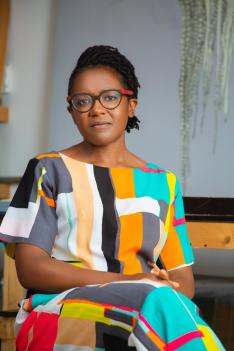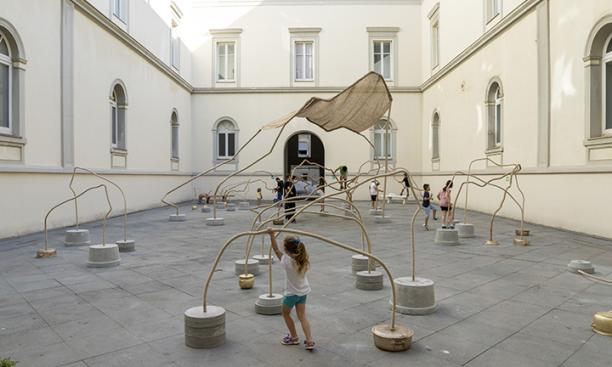


In a time of risk and worry, strife and political entrenchment, Nigeria-based artist Temitayo Ogunbiyi ’06 invites us into a mind-opening realm of play.
“Play is something that we should continue to do throughout our lives,” says Ogunbiyi, a recent Ford Foundation Fellow and Smithsonian Artist Research Fellow. “How can you expand your thinking if you don’t try approaching the world in new ways?”
Over the past four years, Ogunbiyi has designed five “play spaces”: large installations that blur the boundary between museum and playground, art and physical exploration. Her most recent work — the first solo exhibit by a Black woman in the Museo d’Arte Contemporanea Donnaregina in Naples, Italy — was a playscape of airy, undulating bars that enticed visitors to climb and swing.
“My work is about opening up possibilities for play,” says Ogunbiyi. “I think there’s something to be said for creating spaces where people can discover what play can be, as opposed to conforming to the limitations of conventional play objects.”
Ogunbiyi sees no contradiction between the playful and the serious. Rather, she believes that open-ended exploration — by children, but also adults — can inspire social progress on pressing issues such as racial violence.
“There’s something about the expectations people have of play that helps them to let their guards down, that creates openings, that builds connections between people who might not otherwise connect,” said Ogunbiyi.
As she designed her most recent installation, Ahmaud Arbery — an unarmed 25-year-old Black man — was fatally shot while jogging in Georgia. She titled her work, “You Will Play in the Everyday, Running” to memorialize Arbery’s killing, and to impress the importance of having safe places to recreate.
“Some kids grow up too fast,” reflected Ogunbiyi. “Some kids are not in a place where they can safely play. And in that historic moment of great friction and upheaval, I wondered about the possibility of creating room for people to learn to tolerate those who are different.”
The names of Ogunbiyi’s play spaces all begin with “You Will” — for example, “You Will Find Peace and Play Among Palm Trees.” The naming scheme reflects the structure of Nigerian prayers, which often begin with these two words.
“They stand as declarations,” says Ogunbiyi. “The certainty with which people use ‘you will’ deeply resonated with me.”
Her playground series grew from her experience raising two children in Africa’s most populous city, Lagos, Nigeria, where she struggled to find designated play spaces that weren’t overly prescriptive. She also noticed that most playground designs were imported from the West.
“I began to think that play and stimuli for kids could be so much more,” says Ogunbiyi. “I also became interested in creating play spaces that responded to local histories of design.”
She builds from materials and forms of local significance: Steel bars mounted in concrete bases evoke homemade exercise equipment used in Lagos. The bars are wrapped in fiber made from jute, the leaves of which many Nigerians eat. Here and there she uses brass and bronze, key metals used in Nigerian fine art.
During the COVID pandemic, Ogunbiyi has incorporated more household materials and objects to draw creative attention to the domestic, and thus challenge the stultifying effects of lockdown. For her most recent exhibit, for example, she cast the concrete and brass bases for her bars from culinary crocks.
“I wanted to bring the domestic into public space to think about working with what we have,” says Ogunbiyi. “We can stimulate ourselves with what we can find around us.”
Ogunbiyi decided to become an artist while working with Eve Ascheim, Julia Jacquette, Denyse Thomasos, and other Princeton mentors who provided support, but also freedom to explore. She recalls an atelier course with Toni Morrison as a pivotal point in her artistic development.
“Being at Princeton showed me how life as an artist might be possible,” recalled Ogunbiyi. “‘Go out and change the world’: That was the charge.”